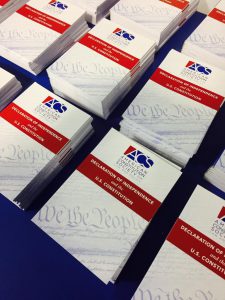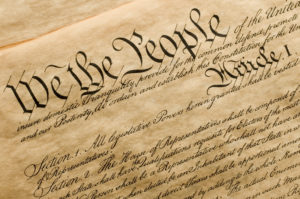Resources on Constitutional Interpretation
About
 For decades, conservative judges, scholars, lawyers, and activists have trumpeted a cramped, frozen-in-time understanding of the Framers’ grand undertaking, suggesting that the Constitution should be interpreted like a code of rules to be applied to whatever controversies arise. That may work in easy cases, but not in the hard ones – the kind that make their way to the Supreme Court and impact the lives of everyday Americans. After all, as the first Chief Justice John Marshall wrote in McCulloch v. Maryland, a constitution’s nature “requires that only its great outlines should be marked, its important objects designated, and the minor ingredients which compose those objects be deduced from the nature of the objects themselves. … [W]e must never forget that it is a Constitution we are expounding.”
For decades, conservative judges, scholars, lawyers, and activists have trumpeted a cramped, frozen-in-time understanding of the Framers’ grand undertaking, suggesting that the Constitution should be interpreted like a code of rules to be applied to whatever controversies arise. That may work in easy cases, but not in the hard ones – the kind that make their way to the Supreme Court and impact the lives of everyday Americans. After all, as the first Chief Justice John Marshall wrote in McCulloch v. Maryland, a constitution’s nature “requires that only its great outlines should be marked, its important objects designated, and the minor ingredients which compose those objects be deduced from the nature of the objects themselves. … [W]e must never forget that it is a Constitution we are expounding.”
While the question of how we interpret the Constitution is always of supreme importance, the election of President Trump has elevated new constitutional questions never before fully contemplated. It has forced us to explore the meanings of little known constitutional provisions like the Emoluments Clause, and reinvigorated discussion of the contours of the First Amendment when it comes to hate speech or how our First and Second Amendment rights interact when citizens’ wish to exercise their right to assemble while carrying weapons.
Interpretation
How Should We Interpret the Constitution?

Debates have been raging since the founding document’s inception about its meaning and scope, and different interpretive approaches have arisen in response to those debates. How should judges approach cases that don’t allow for straightforward application of technical provisions? What principles can they rely upon when interpreting the Constitution so that they remain faithful to the values it espouses and respectful of the judicial role in our constitutional order? How can we understand the Constitution’s commands in the face of challenges the Framers couldn’t have imagined?
The following are ACS analysis and videos of events where these questions were explored in depth.
Reading:
Keeping Faith With the Constitution by Pamela S. Karlan, Goodwin Liu, and Christopher H. Schroeder
Issue Brief: The Framers’ Constitution: Toward a Theory of Principled Constitutionalism by Geoffrey R. Stone and William P. Marshall
The Living Constitution by David A. Strauss
It’s a Constitution We Are Expounding by Laurence H. Tribe, Pamela S. Karlan, and Karl Thompson
Multimedia:
Let’s Talk About Text
Panelists at the 2019 ACS National Convention discuss the origins of originalism and the ways in which progressives can approach debates on constitutional interpretation. Is there a danger in signing on to a textualist or originalist approach to constitutional interpretation? How should progressives reconcile these arguments? Watch the panel discussion on the path forward for progressives making constitutional interpretation arguments.
All the President’s Business Interests: The Emoluments Clauses and the Trump Administration
In July 2017, ACS hosted a discussion and analysis of the litigations, including the substantive claims, the history of the Emoluments Clauses, questions about the parties’ standing, and what remedies might be available. Lawyers representing plaintiffs in all three cases participated. Watch the panel discussion on the Emoluments Clause.
Pamela S. Karlan and Nicholas Quinn Rosenkranz debate Constitutional Interpretation
Text, History and Principle: What Our Constitution Means and How to Interpret It featuring: Akhil Reed Amar, Joan Biskupic, Pamela S. Karlan, Geoffrey R. Stone, Judge J. Harvie Wilkinson, and Judge Diane P. Wood
Interactive Constitution, National Constitution Center
